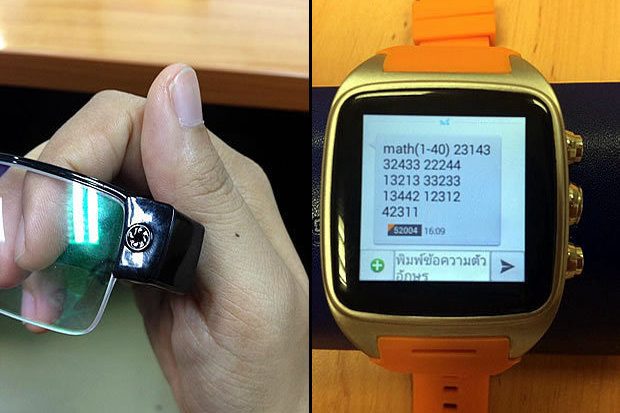High tech devices take cheating to a whole new level

Medical school applicants were caught in a high-tech exam cheating system that involved spy glasses to record the test and tutors sending coded correct answers via smartwatches.
Some people will go to great lengths to get into medical school as was recently proven when students were caught using a seriously high-tech method to cheat.
Arthit Ourairat, dean and president of Rangsit University in Thailand, posted pictures on Facebook of “smart” glasses and smartwatches used to cheat on admissions tests, held May 7 and 8, for its College of Medicine, Faculty of Dentistry and Faculty of Pharmacy. “This was the most high-tech exam cheating system I’ve ever seen,” Ourairat told the Manager.
“The team did it real-time,” AFP reported. The team consisted of three students wearing glasses with unusually thick earpiece frames which had a tiny wireless spy camera embedded in the frame. There are conflicting reports as to whether the glasses were livestreaming the exam questions or capturing the questions, but the exam was sent to a group of “tutors.” The tutors would then supply the correct answers to students wearing smartwatches.
According to the Bangkok Post, proxies, who were paid to take the exams, wore camera-equipped glasses to capture the exam questions. The proxies stayed 45 minutes, the minimum time allowed to take the tests, before leaving the test center. The proxies met another person waiting outside to download the tests and email them “to one or more tutorial schools.” The maximum time to take the exam was three hours, so the tutorial schools sent the correct answers “written in code” back to students wearing smartwatches.
The cheating scheme was uncovered after an instructor seized a smartwatch during the Saturday morning session and another in the afternoon session. Instructors allegedly became suspicious over the thick-framed glasses as well as three people leaving at the same time after the 45-minute minimum testing time requirement. Two glasses and another watch were seized on Sunday. The tri-exam reportedly covered math, English and biology.
Cost to use high-tech cheating
RSU vice-rector Nares Pantaratorn said the smartwatches were provided to the cheaters “by a private tutoring institute located near the campus.” One of the cheating students admitted to paying 50,000 baht, about $1,420, as a “deposit” and was supposed to pay another 800,000 baht, about $22,714, after passing the test. The people wearing the spy glasses admitted to being paid 6,000 baht, about $170, for each job. One student admitted to taking the tests after reading an advertisement which “guaranteed a 100% pass in the entrance exams to RSU-medicine-related faculties.”
The three students caught cheating via smartwatches have been “blacklisted” and won’t be allowed to apply at Rangsit University. Authorities are reportedly investigating to determine if one tutoring school was involved or if there was a network of tutors behind the cheating scheme. The university intends to file both civil and criminal charges. From here on out, students will only be allowed to take pencils into the exam room; glasses will be carefully checked for cameras before being allowed.
The cheating has been compared to something cooked up for Mission Impossible.
3,000 potential university students were testing for 130 spots in Rangsit University’s medical program. After discovering there were at least three people cheating, the preliminary tests were disqualified for “cheating carried out by a well-organized syndicate and the use of electronic devices;” potential students who took the entrance exams will have to retake the tests which have been rescheduled for May 31 and June 1.
How to submit an Op-Ed: Libyan Express accepts opinion articles on a wide range of topics. Submissions may be sent to oped@libyanexpress.com. Please include ‘Op-Ed’ in the subject line.
- Libya’s HCS invites applicants for key state roles - December 31, 2023
- UK calls on Iran to prevent escalation in Israel-Hamas conflict - November 05, 2023
- Libyan Interior Minister: Immigrant shelter costs a fortune - November 05, 2023


